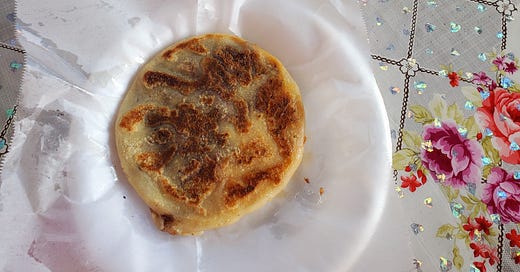Over the weekend, I debated whether to post this. Am I overthinking this? Am I being too sensitive? It’s just a joke, no exageres.
But here’s the truth: It did bother me. And if something bothers you, that’s not being "too sensitive", that’s awareness. That’s having boundaries. And that’s worth talking about.
Opinions Shape Culture
Opinions are just that, opinions. But opinions with a platform? They shape culture. And I’ll die on this hill: what we vocalize, we normalize.
Recently, I came across a shirt that said Make Pupusas 25 cents Again. My first reaction? Oh no. My second? Frustration. Now? Disappointment, but maybe I’m the only one who finds this concerning?
I don’t think I am. But in an effort to broaden the conversation beyond my own perspective, I spoke with three Salvadoran restaurant owners: one from Derwood, Maryland, one from Oakland, and one from Los Angeles.
1. It Undervalues Women’s Labor
While some men make pupusas, they likely learned from Salvadoran women—the backbone of this craft. Joking about the cost of pupusas is, at its core, joking about undervaluing the labor of Salvadoran women, many of whom have spent their lives making food that nourishes us.
Lucy Campos, owner of La Brasita in Derwood, Maryland, often hears customers complain about pupusa prices. She explained:
“It’s a lot of work for the price. Customers don’t see what happens behind the scenes. There’s an entire kitchen team working hard. First, you have to cut, season, and fry everything. Then you have to grind it in a mill, cook it again, and prepare it.”
Lorena Guzman, owner of Los Molcajetes in Los Angeles, found the shirt amusing, “a jab at the orange blob.” But she also said:
“I’d rather have customers understand our prices and value our quality, even if it means paying a bit more. I’d much rather absorb potential criticism about our prices than risk compromising on quality and disappointing our customers.”
2. Cheap Laughs, Costly Consequences
The phrase plays on a fascist slogan (which, don’t get me started on that). But beyond that, it dismisses the reality of economic struggles. Those so-called "good old days" weren’t actually good for the people making pupusas.
Some consumers might reminisce about getting 4 pupusas for a dollar. Not that long ago, a family of four could eat for $30-$40. But let’s unpack that math: if a woman had 20 customers and each of them ordered 4 pupusas, she would have made only $20 for an entire day’s work. That’s if her customers ordered 4 each, she could have potentially made less.
How is that funny?
If we’re going to talk about centavos, let’s talk about how little Salvadoran women were paid for their labor then—and how little that has changed now.
3. The Cook is More Special Than the Eater
Cooking isn’t just a transaction. It’s an act of care, skill, and history. Cooks take raw ingredients and they make them not just edible but delicious, and nutritious. Demanding lower prices without considering who is making the food and under what conditions is entitled at best, exploitative at worst.
Campos put it bluntly:
“It makes me sad because customers don’t realize that cooking is an art. Making pupusas is complicated—it’s not nothing. It seems easy, but it’s not.”
4. We Normalize What We Tolerate
There’s an inherent bias in what we deem acceptable to charge for food. I don’t love pitting one cuisine against another, but for the sake of a teachable moment, let’s talk about ravioli.
I love ravioli. If it’s on the menu, 9 times out of 10, I’m ordering it. But it always comes at a premium price. The most I’ve ever paid? Three small ravioli for $32. Once, I got one large raviolo for $25.
So why is pasta, made with flour and egg, considered artisanal, while pupusas, made with masa and stuffed with quality ingredients, are expected to stay cheap?
Anthony Salguero, owner of Popoca in Oakland, has dealt with this mindset firsthand:
“There’s a mental price tag we put on certain foods but not others. A bowl of pasta and a pupusa with high-quality ingredients require the same amount of skill or labor, but the expectation is that the pupusa should be much cheaper. Subconsciously, what is being said, is that some people are worth more than others.”
Salguero acknowledges that these biases are learned. “I don’t fault people for it, but I think it’s helpful when you have the thought, ‘This is too expensive for a pupusa,’ and ask, ‘Why do I think that?’ Most people will realize the answer doesn’t align with the values they want to hold.”
His hope is that this moment of reflection leads to even bigger, harder questions—ones that shift the focus from the price of a pupusa to the systems making it difficult for small businesses to survive.
"Why does supporting a small business feel unaffordable right now?"
The truth is, no restaurant is truly thriving in this climate. At best, they are barely keeping the lights on.
5. Comedy Should Punch Up, Not Down
Something I learned from one of my favorite comics, Marcella Arguello: jokes should punch up, not down.
Mocking the price of pupusas, something deeply tied to the labor of working-class Salvadoran women isn’t edgy. It’s misguided.
I get it. People joke about food prices because they’re feeling economic anxiety. But instead of asking why pupusas aren’t 25 cents, we should be asking:
"Why are wages so low that food feels unaffordable?"
"Why is the restaurant industry in crisis?"
"Why do food costs keep rising while worker pay stays stagnant?"
And if you really want cheap pupusas?
I wrote a cookbook. Make them yourself.
Alternatively, I dare you to create your own restaurant and see how far you go with $0.25 pupusas on the menu.
But if someone else is making them for you—pay them and be glad there’s a place that saves you the trouble.
The SalviSoul Book Club
We are moving through the book!
As for reflections, I have repeatedly thrown a few f bombs while reading. This next week, we are reading pages 100-150. I hope if you’re feeling those f bombs like I have, you’ve been able to keep going. We’re doing this together!

Milestone Unlocked
This newsletter has been officially going on for one month!
Now that I have a few newsletters under my belt and I have a bit of a groove and routine, I’m really enjoying this.
Thank you for being here and reading. I don’t know how long this will last for but expect a weekly newsletter every Tuesday, unless I say otherwise.
Relajo Recommends
Not that you asked, but writing and music, are everything to me. I wrote The SalviSoul Cookbook thanks to a playlist of 5 songs, on repeat for hours, days, weeks, and years.
I listened to this one song on repeat, for hours, while unpacking my thoughts for this newsletter. Listen to it and see what thoughts swim to the surface for you.
Como siempre, con amor y SalviSoul,
Karla







Hey Karla,
Not only are your feelings valid, but you also offered exceptional evidence to support your statement. Thank you for speaking up! 'Nuff said. ✊🏽
Thank you, kind Karla.
I've been following you since Latina to Latina interview.
I needed to read this. Helpful you're aware & willing to teach.
Your & Mr. Salguero's comparison of ravioli labor to pupusa labor... ouch; I see.
Thank you also for quoting comedian Marcella Arguello on not punching down. 'Had never before known her.
To pupusas makers!
Clara